How relevant and influential is the legacy of the ancient Greeks to the western civilisation even today, is a question that has often been asked by many. The truth is the effects of the ancient Greek world have been ingrained so deeply into the West’s collective unconscious that we do not even notice it. The recognition of the impact of the ancient Greeks was once more highlighted by a BBC poll about the “100 stories that shaped the World”. Homer’s Odyssey topped the poll of 100 Stories that Shaped the World, with the other famous Homeric poem “The Iliad” coming in 10th spot. Natalie Haynes of the BBC looks at why the epic poem has survived for millennia.
If any story can be considered the greatest tale ever told, Homer’s Odyssey has a better claim than most. Twenty-four books long, it runs to more than 12,000 lines of hexameter verse (the poetic form used in Greek epic and Latin epic after it) and follows the adventures of the wily, complicated Greek hero, Odysseus, in the aftermath of the Trojan War. The Odyssey has been valued as a cultural highpoint for millennia: in the 5th Century BCE, the Athenian playwright Aeschylus referred to his tragedies as “slices from the banquet of Homer”.
Writers from Dante to James Joyce to Margaret Atwood have taken inspiration from this original quest story. But Odysseus’ quest itself is an almost mundane affair, amid the gods and monsters which populate the poem. Because it is not about sailing off to find something wondrous and new (a golden fleece, for example, or an undiscovered land). It’s about a man trying to get home at the end of a 10-year war.
These are the top 10 book that changed the world:
1. The Odyssey (Homer, 8th Century BC)
2. Uncle Tom’s Cabin (Harriet Beecher Stowe, 1852)
3. Frankenstein (Mary Shelley, 1818)
4. Nineteen Eighty-Four (George Orwell, 1949)
5. Things Fall Apart (Chinua Achebe, 1958)
6. One Thousand and One Nights (various authors, 8th-18th Centuries)
7. Don Quixote (Miguel de Cervantes, 1605-1615)
8. Hamlet (William Shakespeare, 1603)
9. One Hundred Years of Solitude (Gabriel García Márquez, 1967)
10. The Iliad (Homer, 8th Century BC)






























